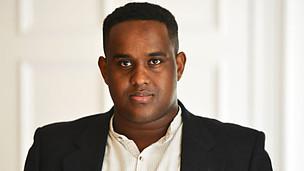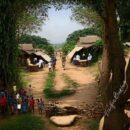Who are the Sudanese?
Sudanese cannot agree on their common identity, but up to now they have not disagreed on who counts as a Sudanese. The first disagreement may yet divide the country. But partition should not be a reason to tear up the precious and under-appreciated consensus on who is a member of the Sudanese community.
Since the independence of the Republic of Sudan half a century ago, the identity of the Sudanese nation and state has never been clear. Independence meant different things to different people. Was it a prelude to union with Egypt? Was it a prelude to a federal system of government? Was it Sudan’s second independence–a resurrection of the 19th century Mahdist state? Was Sudan to be a secular modern state? These questions, unresolved at independence in 1956, were not resolved by the Comprehensive Peace Agreement, and remain unresolved today.

Despite all the internal wars which the Sudanese people have fought in their search for a collective identity for their nation, and the fact that some ideologies have been inherently discriminatory, no political party has ever mobilized to try to exclude another group from being Sudanese altogether. Sudanese do not disagree on the fact that they are all Sudanese.
Where there are disagreements on citizenship–such as recent immigrants across Sudan’s western border–they serve to show the underlying strength of the consensus on who counts as Sudanese. Vast numbers of Sudanese citizens have ancestry traceable to west Africa, and Sudan has been accommodating to them all. An important if little-known chapter in the SPLM’s history was its Pan-African Brigade which included citizens of other African countries ready to make common cause in building a New Sudan. No nation in Africa has been more hospitable to incomers.
Will this common, expansive identity change with the southern Sudanese vote on self-determination, in little more than a year? I expect not. Should the south separate, the identity question will not be resolved, and the debate on the identity or identities of the Sudanese nation or nations will continue.
Should the southerners choose independence, what will the new country be called? Obvious names include “South Sudan” and “New Sudan”, both names that reaffirm the southerners’ attachment to a common Sudanese identity.
Whatever happens between now and the referendum, and in the aftermath of the referendum and possible partition of the country, it is essential that ordinary citizens of Sudan should not become the victims. Violation of citizenship rights is one of the most common abuses in the aftermath of partition or separation. Africa is no stranger to such abuses, and there has been a vibrant debate on the topic of citizenship rights on the African Arguments blog, following on the recent publication of Bronwen Manby’s book, Struggles for Citizenship in Africa.
In 2004, Egypt and Sudan agreed the “four freedoms”: freedom of movement, residence, ownership and work in either country. Some Sudanese see this as a model for a future agreement between north and independent south. I doubt whether this would be sufficient to guarantee full respect for human rights of southerners in the north and northerners in the south, and for members of those communities that straddle the internal boundary. I hope that something stronger could be agreed: a common citizenship of north and south.
How this would work, I am not at all sure. The complexities of any state partition are formidable. It is important that citizenship issues are discussed now, and agreements are reached in the next twelve months.







Alex,
It is indeed very impressive that despite the political struggle to formulate an all inclusive political definition of our national identity, and despite the the fact that as Sudanese we tended to label each other as Arabs, Africans, or even Nubawi, Gharabi or Janoubi (From the Nuba Mountains, or the west or the south) to the more derogatory and more exclusive Hur or ‘abd (freeman or slave). We all agree that we are Sudanese, and it is more evident when we fulfill our social obligations.
A friend of mine told me it is only weika (dried okra) which unites us all, we all eat it, albeit with different types of Kisra, Assidah or bread.
Now that we face the reality of political fragmentation, into two states, or possibly more… the onus will be on the north to re-imagine its identity and to create a new political identity that will have to be inclusive for all those who will choose to reside in the north.
On another point, the geographical landscape of Sudan straddles across vast terrains, and corresponds in size to Western Europe, the building block of the current EU.
Perhaps in years to come following the great upheaval which we are about to encounter, a new entity will emerge allowing all Sudanese communities to celebrate being Sudanese.
I suppose we have something to celebrate as we are arguing over who should be INCLUDED as Sudanese while other nations such as Cote d’Ivoire are fighting over who should be EXCLUDED as Ivorians! But the most regressive citizenship laws in the region are to be found in Egypt. There are tens of thousands of Egyptians–people who were born of Egyptian mothers, brought up in Egypt, culturally Egyptian, with nowhere else to call home–who can never claim Egyptian nationality because their fathers are from other countries. The “four freedoms” agreement, which incidentally has not yet been ratified by the Egyptian parliament, is always going to be inadequate because it doesn’t deal with the deficiencies of Egyptian nationality law itself.
To my knowledge, Sudan has the same backwards laws. Any child born of a Sudanese mother and a non-Sudanese father (i.e. European or American) cannot claim Sudanese citizenship. Please correct me if I’m wrong. But last I checked, this was the case.
Let us Sudanese be less mindful of Egypt’s failings. Egyptians are as paradoxical as we are deluded in thinking that we are relatively less paradoxical than them. At least they have a well-controlled and secular state.
Furthermore, I have lived in the Ivory Coast. They are a much more democratically capable and inclusive nation than our Islamo-twilight zone, quasi-sufist, passive aggressive social norms. This is what gets me about Arabized and Gulf-raised Sudanese… this self-righteous ego that oozes every once in a while and really demonstrates how little-minded we all really are. A Sudanese relative of mine once asked me… “is it really possible that we Sudanese are masakeen (weaklings) AND baleedeen?”… to which I replied “oh yes we are… we are socially defective and it is time we realize it otherwise the world will punish us for it”.
Jamaledin, that’s incorrect. My mother is Sudanese and although I’ve never claimed the passport, I’m eligible. Egypt and Sudan are the only Arab countries to allow the mother to pass on her citizenship regardless of the father’s.
So many things is happenning in Sudan these days, but crucial.
Regarding the citizenship rights…. i have read an article on sudan tribune where the sudanese president made a statement that Fellata or the hausa fulani groups are not entitled to cast their vote…. are all the west african tribes (hausa,fulani bornu and tama) eligible to sudanese citizenship? even many of them do not have tenancy rights which is crucial to get sudanese citizenship…. plz throw some light on this issue!